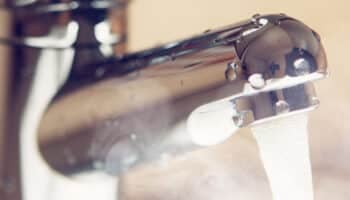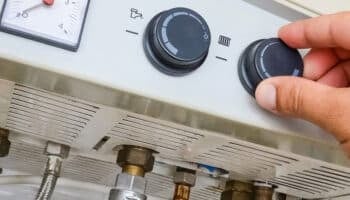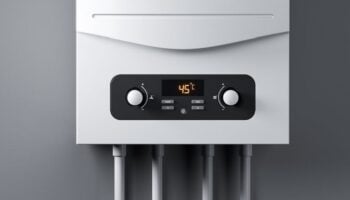We've independently reviewed this article to make sure it's as accurate as we can make it.
To find out more about our article creation and review process, check out our editorial guidelines.
Having no hot water is infuriating, especially if you have recently moved into a new house or apartment. Nobody enjoys having to call out a contractor. But sometimes that’s your only option—unless you enjoy cold showers, of course.
Before jumping in, however, you need to check whether your water heater is gas or electricity powered.
As a quick sanity check, make sure that you don’t have any issues with your utility supply. If your gas water heater isn’t working, it’s worth checking that your gas supply is working fine (and vice versa).
It can also be helpful to familiarize yourself with the different types of water heaters available. Having a better understanding of the workings of these plumbing fixtures means that you’ll be able to explain the issue to a plumber or electrician in more detail.
A quick overview of different water heaters:
- Conventional Storage Tank Water Heater: An insulated tank using heated elements and valves to control the temperature of the water and pressure.
- Tankless Water Heater/On-Demand Water Heater: Water gets run through extremely hot coils as needed, providing warm water instantaneously.
- Heat Pump Water Heater/Hybrid Water Heater: A water heater relying partly on heat in the air and on the ground, and partly on electricity. Its efficacy depends on the heat that is available in the surrounding area.
- Solar Powered Water Heater: A heater that gets its power from solar panels on the house’s roof.
- Condensing Water Heater: Gas-powered water heaters that extract heat from exhaust gas that would otherwise get expelled through a chimney.
These five types of water heaters function in different ways, so if your hot water goes AWOL, you will need to check for issues specific to the water heater you have. The most common, however, are conventional storage-tank water heaters.
So, what should you do when you suspect an issue with your water heater? We have nine suggestions to point you in the right direction.
Yoy Can Try These Steps:
Check The Warranty
This step doesn’t have to come first, but it’s good to know. Especially if your appliance is still under warranty and can therefore get repaired at no cost. Hot water heaters are under limited warranties, which you can determine simply by checking the serial number. Each tank’s serial number shows when it was made and can tell you what kind of warranty it has, if any. If it turns out that your water heater needs more repairs than you’re equipped to handle, contact the manufacturer with all the details.
It’s also important to realize that water heaters aren’t made to last forever. People with tanked water heaters can expect them to work for around 8 to 15 years (depending on whether they’re powered by electricity or gas), while tankless water heaters generally last up to 20 years.
Give It Time To Reheat
If you have just moved into a new place and are unfamiliar with the normal “habits” of your new water heater, it’s a good idea to give the system a bit more time to reheat before calling a electrician. If it doesn’t heat again, however, there’s likely a fault that needs fixing.
Check The Size Of Your Tank
One reason you might have no hot water is simply that you’re using more than the heater has the capacity to replace. This can be an issue when moving into a new house, especially if you’ve never had to worry about it before. Some homes have much smaller water heater tanks that can get depleted from one or two long showers. In these situations, there are two options: use less hot water, or replace the tank.
Gas Water Heater: Check The Gas Supply
Water heaters powered by gas can run into trouble if the gas level is too low. This can either mean that your gas supply to the entire house is off, or that your water heater in particular has run out of gas. You should also check the gas meter, the heater’s shutoff valve, and the control knob to see exactly where the problem lies.
Gas Water Heater: Check The Pilot Light
The pilot light in a gas water heater keeps the water warm, and should be visible at all times through the inspection window as a small blue flame. Problems with the pilot light can stem from several different root causes, including faulty thermocouples, clogged pilot tubes, and damaged or clogged flex tubes. The thermocouple, which senses temperature and shuts off gas when the pilot light goes out, is at the bottom of the heater and warms the water from there.
No pilot light means no gas and no hot water. Even if the only problem is a dirty pilot light, it’s a good idea to get a professional to assess the situation.
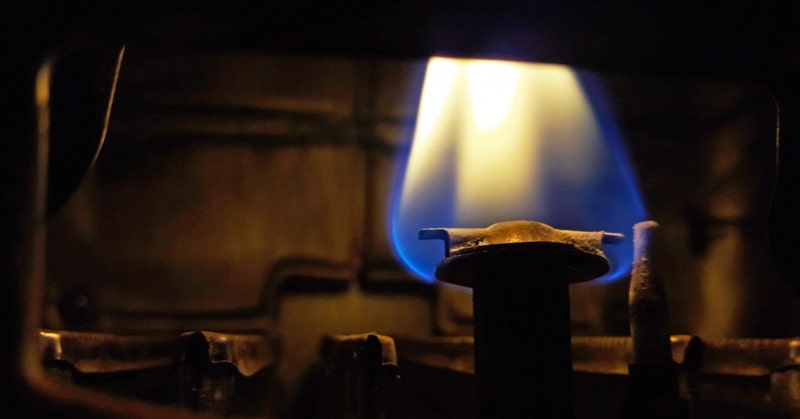
Gas And Electric Water Heaters: Check The Thermostat
The thermostat dial is on the front of your water heater tank and controls the temperature of the water. It should be set to 120 degrees Fahrenheit. If it isn’t, turn the dial up to 120 and give it a few minutes before checking if your hot water has returned. If this doesn’t work, a pro should be able to get to the bottom of the problem.
Electric water heaters often have two thermostats; one near the top and the other at the bottom of the tank. While one thermostat heats the water, the other switches off to keep the tank at a stable temperature. If a faulty thermostat gets stuck and causes the water to become excessively hot, this can place the electrical system under intense pressure and cause the circuit breaker to trip.
Extra tip: electric water heaters have two heating elements linked to the upper and lower thermostats. If you have no hot water, it’s possible that one or both elements are faulty. General wear and tear can cause an element’s casing to break open, which can short-circuit and consequently trip the circuit breaker.
Gas Water Heater: Check Safety Shutoff Valve
Shutoff valves ensure that water in your tank doesn’t overheat. While they are essential safety features, these valves can stop water in the tank getting heated when they sense that temperatures have risen too high. Unfortunately, this particular problem isn’t something you can fix yourself. If gas is shut off, there is no way to light the burner again, which usually means getting a new valve installed.
Electric Water Heater: Check Electricity Supply
One common and easily resolved issue with electric water heaters is the interruption of electricity. If your appliance runs off electricity, the first step to take when you have no hot water is to check the main switch on the water heater and the circuit breaker connected to it.
Circuit breakers are activated if they detect dangerous electrical activity. It is strongly advised that you don’t force them open. If your water heater keeps tripping them, it might be worth contacting an electrician. If you notice other devices/appliances plugged in close by are tripping the circuit breaker, removing those could solve the problem.
Gas And Electric Water Heaters: Check For Leaks
Leaks are bad news whether they’re in the roof or your petrol tank. This applies to water heaters too —both those powered by gas or electricity. Tanks are generally fitted with a temperature pressure relief valve to prevent water from becoming excessively hot. Although some condensation around the valve is normal, constant dripping or running can cause electrical faults as it collects around elements.
Water heater tanks themselves can leak from the base and this is increasingly likely the older they get. If you suddenly find yourself without hot water, there is also a chance that your heater is leaking heavily enough to drain the entire tank.
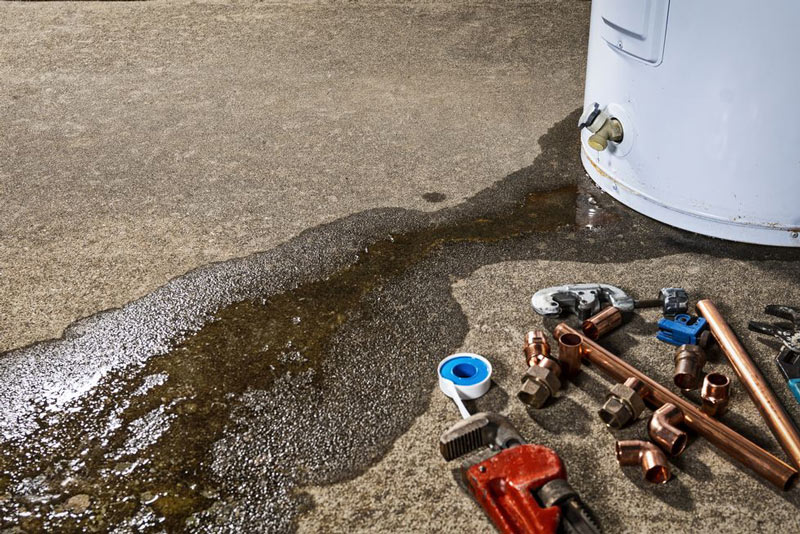
Prevention Is Better Than Cure
Like any other home appliance, water heaters should get checked out regularly to prevent issues from becoming serious. When you’re moving a house, add this to your checklist and then keep a regular calendar reminder for future maintenance, too.
Picking up a leak, faulty thermostat or defective element before they do long-term damage can save time and money, as well as minimize dangers such as your water heater tank exploding—a relatively rare occurrence, but still possible. A small leak might not seem serious at first, for example, but a malfunctioning and leaking temperature and pressure valve can allow pressure inside the tank to reach a critical level. A water heater explosion is extremely dangerous.
DIY Or Call An Expert?
People are often keen to tackle their water heater issues themselves to save money, but a lot of the time this is ill-advised. Water and electricity do not mix well, while gas leaks—and potential explosions—can be deadly.
If the issue is easily resolved, then a DIY approach is fine, but for more complex problems, you should always consult a professional. Not only do they have the technical knowledge to fix your appliance, but they know how risky water heater repairs can be, and how to minimize those risks.
Steps that you can take yourself include checking your tank regularly to make sure there are no obvious leaks or other wear and tear, cleaning the area regularly to prevent clogged valves and pipes, and keeping an eye on your hot water usage.





